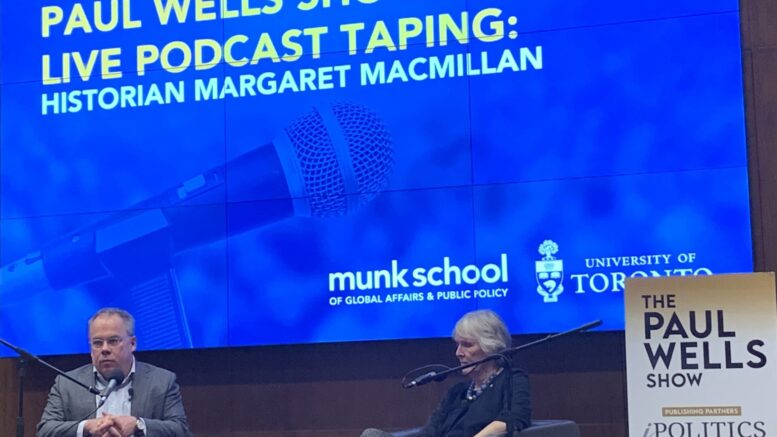風蕭蕭_Frank
以文會友瑪格麗特·麥克米倫:關於烏克蘭的未來,曆史可以告訴我們什麽?
外交事務采訪 2023年6月21日 外事專訪
https://www.youtube.com/watch?v=jGpbhuFVIkM&ab_channel=ForeignAffairs
外交事務邀請您收聽其播客《外交事務訪談》。 瑪格麗特·麥克米倫 (Margaret MacMillan) 的這一集最初發布於 2023 年 6 月 15 日。
烏克蘭的反攻將成為二戰以來歐洲最大規模的軍事行動。 當基輔努力擊退俄羅斯軍隊時,人們非常關注如何部署包括無人機和衛星互聯網終端在內的現代技術。 但拋開這些新的先進係統不談,烏克蘭前線的戰場場景看起來就像是 1916 年西部前線的場景。
對於曆史學家瑪格麗特·麥克米倫來說,第一次世界大戰的影響遠遠超出了來自烏克蘭的圖像。 正如她在《外交事務》雜誌上發表的一篇新文章中所寫的那樣,早期歐洲大戰的經曆“應該提醒我們長期而激烈的武裝衝突所造成的可怕代價”。
我們討論領導人如何決定停止戰鬥、曆史類比的有用性,以及一場戰爭的結束如何為下一場戰爭奠定基礎。
戰爭、重複與進步:瑪格麗特·麥克米倫分享她對烏克蘭戰爭等的看法
https://torontoobserver.ca/2023/03/11/war-repetition-and-progress-margaret-macmillan-shares-her-thoughts-on-the-war-in-ukraine-and-more/?
曆史學家通常會弄錯當前發生的事件,但她說,“總是會忍不住回去尋找相似之處”
保羅·威爾斯和瑪格麗特·麥克米蘭在芒克全球事務與公共政策學院的保羅·威爾斯秀播客節目中坐在舞台上。
保羅·威爾斯在安省多倫多蒙克全球事務與公共政策學院主持了瑪格麗特·麥克米倫的《保羅·威爾斯秀》播客節目。
作者:卡莉達·汗 2023 年 3 月 11 日
著名曆史學家瑪格麗特·麥克米倫在多倫多市中心的保羅·威爾斯秀現場對話中表示,曆史學家不擅長預測未來,而且通常會出錯。
在他們內容廣泛的談話中,她還分析了俄羅斯-烏克蘭戰爭與曆史的相似之處、後COVID-19世界、她的新書的進展以及對網球的熱愛。
“我認為曆史不會以一種簡潔、精確的方式重演,”《戰爭:衝突如何塑造我們》一書的作者麥克米倫說。
“盡管如此,我認為我們經常可以看到過去和現在之間的相似之處或相似之處。”
她以曆史學家的身份審視時事:“我們不擅長預測未來,我們通常會弄錯……” 回過頭來尋找相似之處總是很有吸引力。”
麥克米倫說,曆史研究開辟了可能性。 然而,作為一名曆史學家,她有時羞於回答有關未來的問題。
“我想我們可以問問題。 我認為能夠經常提出問題是嚐試理解某些事情的開始,”她說。
她說,如果英國人和美國人更多地了解伊拉克的曆史,他們就會知道伊拉克人有不喜歡外國侵略者和富有的美國人的傳統。 “曆史本可以幫助他們為這種可能性做好準備,”她說。
麥克米倫還透露了她正在寫的一本有關第二次世界大戰的書的詳細信息。 它將討論蘇聯大同盟中的“三巨頭”與其各自領導人的關係:英國的溫斯頓·丘吉爾、美國的西奧多·羅斯福和蘇聯的約瑟夫·斯大林。
她說,她的書著眼於這些領導人如何試圖為我們今天生活的戰後世界做出規劃,以及戰爭是如何創造出這個世界的。
“他們花了很多時間,即使在戰爭期間,因為他們正在處理巨大的戰略問題,隻是花了很多時間思考下一步做什麽,所以我覺得這非常有趣,”她說。
麥克米倫承認,她對普京入侵俄羅斯感到驚訝,因為“回想起來,有很多跡象”,比如俄羅斯將軍隊調往白俄羅斯和烏克蘭邊境。
“一旦你做出了這種姿態,如果你退縮,那就太愚蠢了。 所以我認為普京讓自己陷入了困境,我確實認為這是普京的戰爭……回想起來很明顯,有些事情將會發生,”她說。
“我很驚訝,我想我很驚訝,因為……我一生都生活在和平的國家,我懷疑對我們大多數人來說,戰爭在其他地方發生過,過去在世界其他地方發生過 ,但對我們來說不是。”
Margaret MacMillan: What Can History Tell Us About Ukraine’s Future? | The Foreign Affairs Interview
2023年6月21日 The Foreign Affairs Interview
https://www.youtube.com/watch?v=jGpbhuFVIkM&ab_channel=ForeignAffairs
Foreign Affairs invites you to listen to its podcast, the Foreign Affairs Interview. This episode with Margaret MacMillan was originally published on June 15, 2023.
Ukraine's counteroffensive is shaping up to be the biggest military operation in Europe since World War II. As Kyiv works to push back Russian troops, there is a lot of focus on how modern technology including drones and satellite Internet terminals is being deployed. But these new advanced systems aside, the battlefield scenes from Ukraine’s frontlines look like they could be from the western front in 1916.
For the historian Margaret MacMillan, the resonance of World War I goes well beyond the images coming out of Ukraine. As she writes in a new essay for Foreign Affairs, the experience of that earlier great war in Europe “should remind us of the dreadful costs of a prolonged and bitter armed conflict.”
We discuss how leaders decide to stop fighting, the usefulness of historical analogies, and how the end of one war can lay the groundwork for the next.
War, repetition and progress: Margaret MacMillan shares her thoughts on the war in Ukraine and more
Historians usually get current events wrong, but ‘the temptation is always to go back and look for parallels,’ she says

Paul Wells hosts Margaret MacMillan for an episode of The Paul Wells Show podcast at the Munk School of Global Affairs & Public Policy in Toronto, Ont.
BY KHALEDA KHAN MARCH 11, 2023
Historians aren’t good at predicting the future, and usually get it wrong, celebrated historian Margaret MacMillan said during a live conversation for The Paul Wells Show in downtown Toronto.
During their wide-ranging conversation, she also provided her analyses of the Russia-Ukraine war to parallels in history, the post-COVID-19 world, progress on her new book, and love of tennis.
“I don’t think history repeats itself in a neat, precise way,” said MacMillan, author of War: How Conflict Shaped Us.
“Nevertheless, I think we can often see parallels or similarities between the past and the present.”
She opened up on being a historian examining current events: “We’re not good at predicting the future, we usually get it wrong…. The temptation is always to go back and look for parallels.”
The study of history opens up possibilities, MacMillan says. Yet as a historian, she is sometimes shy of answering questions about the future.
“I think we can ask questions. And I think being able to ask a question often is the beginning of trying to understand something,” she said.
If the British and the Americans understood the history of Iraq a little more, she says, they would know the Iraqis have a tradition of not liking foreign invaders and wealthy Americans. “History could have helped them prepare for that eventuality,” she said.
MacMillan also revealed details on a book she is working on about the Second World War. It will discuss the relationship between the “Big Three” in the Grand Alliance of the Soviet Union and their respective leaders: Winston Churchill of Great Britain, Theodore Roosevelt of the United States, and Joseph Stalin of the Soviet Union.
She says her book looks at how these leaders tried to plan for the post-war world we live in today, and how that was created out of the war.
“They spent a lot of time, even during the war, as they were dealing with huge strategic matters, just spent a lot of time thinking about what next, and so I’m finding it very interesting,” she said.
MacMillan admits she was surprised by Putin’s invasion of Russia, because “looking back, there were so many signs,” such as when the Russians moved troops out to the Belarusian and Ukrainian borders.
“Once you make that sort of gesture, if you pull back, it’s sort of that foolish. And so I think Putin got himself into a position, and I really do think it’s Putin’s war … It was quite clear in retrospect that something was going to happen,” she said.
“I was surprised, and I think I was surprised also because … I’ve lived in peaceful countries all my life, and war has been something that I suspect for most of us have happened elsewhere, in the past in other parts of the world, but not to us.”




